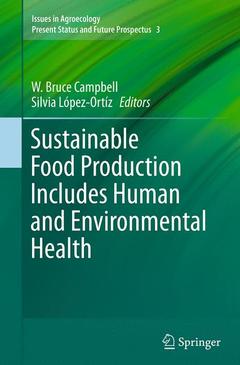Sustainable Food Production Includes Human and Environmental Health, Softcover reprint of the original 1st ed. 2014 Issues in Agroecology – Present Status and Future Prospectus Series, Vol. 3
Coordonnateurs : Campbell W. Bruce, López-Ortíz Silvia

Foreword.- Acknowledgements.- Biosketches of Editors and Contributing Authors.- Chapter 1: The Trading and Use of Agrochemicals.- . The Rise of Agrochemicals and Their Benefits to Humanity.- 2. Problems Associated with Agrochemicals.- 3. Limiting Agrochemical Use - Integrated Pest Management.- Conclusions.- References.- Chapter 2: Critical Evaluation of Genetic Manipulation for Improved Productivity: Is This a Sustainable Agenda.- 1. Introduction: Agricultural Paradigms.- 2. Agriculture, Biotechnology and Biodiversity.- 3. Genetically Modified Crops, Biofuels and Sustainable Agriculture in the United States.- 4. The Ethical Socioeconomic and Political Issues of Biotechnology in Agriculture.- 5. Genetically Engineered Crops, Food Security and Safety.- 6. Conclusions and Perspectives: Supporting Sustainable Agriculture and Development.- Acknowledgements.- References.- Chapter 3: Organic Farming and Organic Food Quality – Prospects and Limitations.- 1. Organic Farming.- 2. Food Quality.- Conclusions and Outlook.- References.- Chapter 4: Veterinary Medicine: The Value of Plant Secondary Compounds and Diversity in Balancing Consumer and Ecological Health.-1. Plant Diversity in Ecosystems.- 2. Plant Diversity and Secondary Compounds.- 3. Plant Secondary Compounds as Medicines – Feedback Mechanisms.- 4. Plant Secondary Compounds as Preventive Agents: Feed-Forward Mechanisms.- 5. Feedback (Treatment) vs. Feed-Forward (Prevention).- 6. Impacts of PSCs on Food Products.- 7. Plant Diversity, PSCs, Productivity and Health.- 8. Grazing and Spatial and Temporal Biodiversity.- 9. Plant Diversity, Prevention and Food Interactions.- 10. Plant Diversity and the Value of Silvopastoral Systems.- 11. Current vs. “Ideal” Feeding Systems.- Acknowledgements.- References.- Chapter 5: Controlling the Introduction and Augmentation of Parasites In and On Domesticated Livestock.- 1. Introduction.- 2. Parasitism in Tropical DomesticatedLivestock: Human Interventions and Welfare.- 3. Hunger and Parasites: Common Enemies in Grazing Systems.- 4. The Spread of Parasitic Diseases and the Potential Impacts.- 5. Parasiticide Medications Used on Ruminant Livestock.- 6. Parasiticide Resistance in Ruminant Livestock.- 7. Improving the Use of Existing Parasiticide Drugs.- 8. Parasiticides in Domesticated Livestock: Ecotoxicity and Environmental Cost.- 9. How do Agroecologically Oriented Operations Affect the Introduction and Spread of Endoparasites and Ectoparasites to Other Animals and Humans?.- 10. Advances in Biological Control for Domesticated Livestock with Emphasis on Tick and Gastrointestinal Nematode (GIN) Control.- 11. Supplementary Feeding to Improve Resilience and Resistance Against GINs.- 12. Concluding Remarks.- Acknowledgements.- References.
Date de parution : 08-2016
Ouvrage de 233 p.
15.5x23.5 cm
Date de parution : 11-2013
Ouvrage de 233 p.
15.5x23.5 cm
Disponible chez l'éditeur (délai d'approvisionnement : 15 jours).
Prix indicatif 158,24 €
Ajouter au panier


